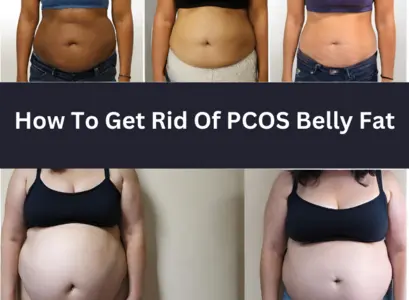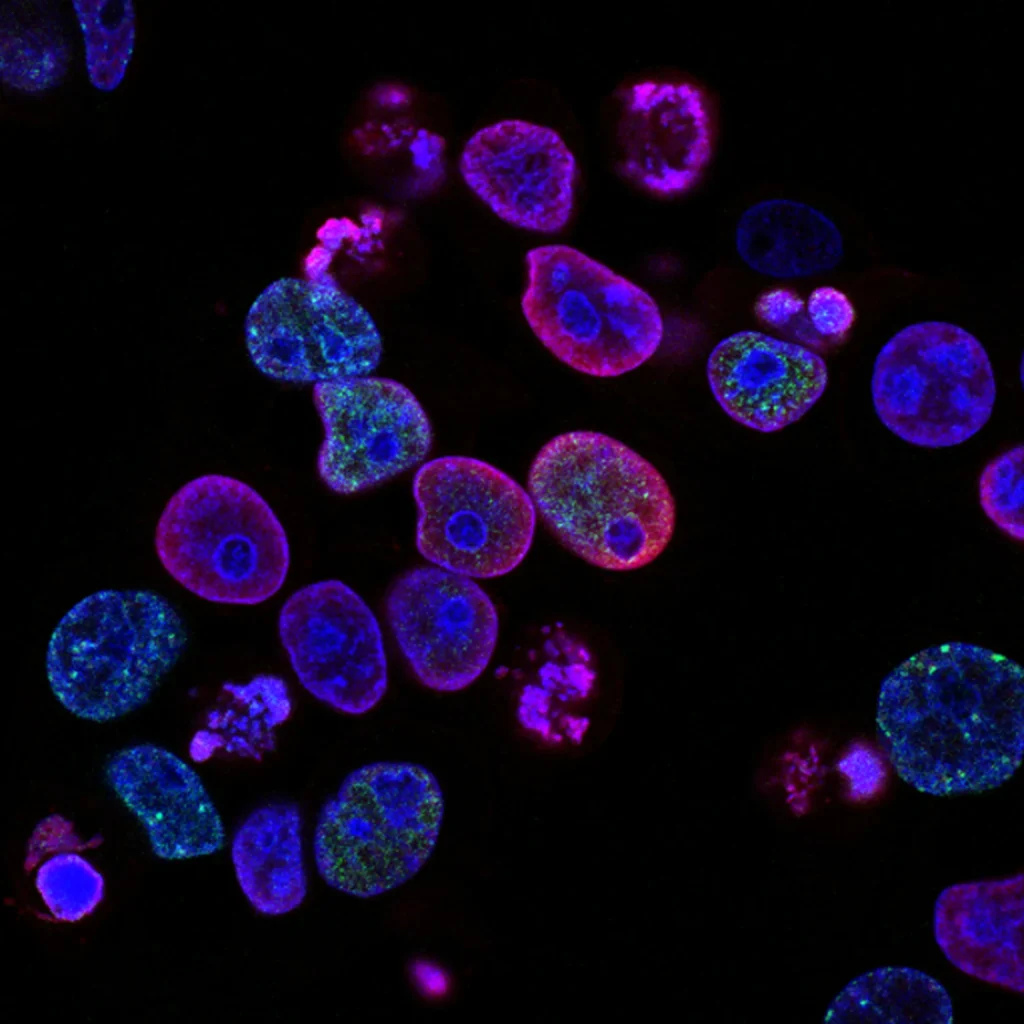How To Get Rid of PCOS Belly Fat: 9 Proven Strategies

- What causes PCOS belly fat
- Impact of PCOS belly fat on health
- Effective and proven strategies to get rid of PCOS belly fat
- Dietary strategies for managing PCOS belly fat
- How to get rid of PCOS belly fat through physical activity
- Natural remedies and supplements for reducing PCOS belly fat
- Medical treatment for PCOS belly fat
- Lifestyle changes for long-term success in getting rid of PCOS belly fat
- Conclusion
- Frequently Asked Questions (FAQs)
- Resources
- Citations
This post may contain affiliate links, meaning I may earn a commission if you make a purchase, at no extra cost to you. I only recommend products I trust. Thank you for your support.
Polycystic Ovary Syndrome (PCOS) is a hormonal disorder impacting 4-20% of women of reproductive age, characterized by hormonal imbalances and small cysts on the ovaries.
One of the most noticeable symptoms is PCOS belly fat, resulting from higher fat deposits in the abdominal area, affecting women independent of their body mass index.
Research has shown that women with PCOS are more likely to have an increased amount of abdominal fat compared to women without the condition.
This condition is not only a cosmetic concern but also a health issue, as it is linked with insulin resistance, elevated male hormones, genetic factors, and metabolic issues.
The exact link between PCOS and belly fat is not fully understood, but it is believed to be related to the hormonal imbalances that occur in women with PCOS.
This article explores 9 proven strategies on how to get rid of PCOS belly fat, incorporating dietary changes, physical activity, stress management, and the role of supplements and medications.
What causes PCOS belly fat
PCOS is characterized by hormonal imbalances that can influence the distribution of fat in the body, particularly leading to the accumulation of belly fat.
Several hormonal and metabolic factors play a role in the development of PCOS belly fat:
1. Insulin Resistance:
Insulin resistance is a key metabolic feature of PCOS and is strongly associated with the accumulation of abdominal fat. Insulin resistance can lead to elevated insulin levels, which promote the storage of fat, particularly in the abdominal region.
2. Androgens:
Elevated levels of androgens, such as testosterone, are commonly observed in women with PCOS. Androgens contribute to the development of visceral adiposity, leading to increased belly fat.
3. Adipokines:
Adipokines are hormones secreted by fat cells. In PCOS, an imbalance in adipokine levels, particularly increased production of pro-inflammatory adipokines, may contribute to the accumulation of abdominal fat and insulin resistance.
4. Estrogen and Progesterone Imbalance:
Hormonal imbalances in estrogen and progesterone levels can affect fat distribution. Reduced estrogen levels and relative progesterone insufficiency in PCOS can lead to an increase in visceral fat deposition, contributing to belly fat accumulation.
5. Ghrelin and Leptin:
Ghrelin and leptin are hormones involved in the regulation of appetite and energy balance. In PCOS, alterations in ghrelin and leptin levels may influence food intake, energy expenditure, and fat accumulation, including in the abdominal region.
6. Steroid Hormones:
Dysregulation of steroid hormones, including cortisol, can affect fat distribution and metabolism, potentially contributing to the development of central obesity in PCOS.

Impact of PCOS belly fat on health
The intricate interplay of hormonal, metabolic, and inflammatory factors underscores the importance of addressing PCOS belly fat, which can have several impacts on health.
1. Cardiometabolic Risks:
The accumulation of abdominal fat in PCOS is associated insulin resistance, where the body’s cells don’t respond effectively to insulin.
This can lead to high levels of insulin in the blood, increasing the risk of type 2 diabetes, hypertension, and cardiovascular diseases.
This risk is compounded by the common occurrence of other symptoms in PCOS such as high cholesterol and triglycerides.
2. Reproductive Health:
Excess belly fat in PCOS can exacerbate hormonal imbalances, leading to irregular menstrual cycles, infertility, and complications during pregnancy and increases the risk of endometrial cancer.
3. Inflammation:
Belly fat, especially visceral fat, is metabolically active and can produce inflammatory substances.
This chronic low-grade inflammation is associated with an increased risk of various health conditions, including heart disease and insulin resistance.
4. Psychological Impact:
The physical changes associated with PCOS belly fat can also have psychological implications, potentially leading to decreased self-esteem and increased psychological distress.
Effective and proven strategies to get rid of PCOS belly fat
Managing PCOS belly fat involves a comprehensive approach that addresses hormonal imbalances, metabolic factors, and overall health.
Several strategies have been proven effective in reducing belly fat and mitigating the associated health risks:
1. Reduce high carb intake:
Lowering carbohydrate consumption, especially from high glycemic index foods, can decrease insulin levels, which is crucial for managing PCOS belly fat.
2. Incorporate fiber and protein:
Enhance your diet with fiber-rich foods and high-quality proteins to improve satiety and reduce overall calorie intake. This combination is beneficial for weight loss and can help in reducing PCOS belly.
3. Healthy fats and probiotics:
Include sources of healthy fats to increase fullness and probiotics for women to support gut health. Both are essential in managing weight and improving the symptoms of PCOS.
4. Regular physical activity:
Engage in a mix of aerobic and strength training exercises. Activities like HIIT and full-body workouts not only target belly fat but also improve insulin resistance.
5. Stress management:
Techniques such as yoga, meditation, and adequate sleep can significantly reduce stress levels, which helps in managing cortisol levels and reducing PCOS belly fat.
6. Mindful eating practices:
Adopt mindful eating to prevent overeating and to address emotional eating patterns, which are common in PCOS sufferers.
7. Insulin regulating supplements:
Consider supplements like inositol, berberine, and magnesium, which have been shown to help manage insulin levels and aid in weight loss.
8. Herbal interventions:
Utilize natural AMPK activators like Berberine and Resveratrol to support metabolic health, which is often compromised in PCOS.
9. Limit alcohol intake:
Alcohol is high in calories and can contribute to weight gain. Limit your alcohol intake or opt for healthier alternatives like sparkling water with a splash of fruit juice.
Dietary strategies for managing PCOS belly fat
A PCOS diet plan plays a vital role in managing PCOS belly fat. By making smart food choices, women with PCOS can help regulate their hormones, control insulin levels, and reduce belly fat.
Here are some key dietary strategies to consider:
1. Focus on whole foods:
Opt for whole grains, fruits, vegetables, lean proteins, and healthy fats. These foods provide essential nutrients while keeping you feeling full and satisfied.
2. Avoid processed foods and added sugars:
Processed foods and added sugars can lead to weight gain and worsen PCOS symptoms. Opt for natural sweeteners like honey or stevia and limit your intake of sugary beverages and snacks.
3. Include high-fiber foods:
Fiber-rich foods like legumes, vegetables, and whole grains can help regulate blood sugar levels and promote satiety, which can aid in weight loss and reducing belly fat.
4. Choose healthy fats:
Incorporate sources of healthy fats such as avocados, nuts, seeds, and olive oil. These fats can help reduce inflammation and promote hormone balance.
5. Stay hydrated:
Drinking an adequate amount of water can help with digestion, metabolism, and overall health. Aim for at least 8 glasses of water per day.
How to get rid of PCOS belly fat through physical activity
Exercise and physical activity are crucial components in the battle against PCOS belly fat.
Regular exercise not only helps burn calories but also improves insulin sensitivity, aids in weight loss, and reduces inflammation.
Here are some effective strategies to incorporate exercise into your routine:
1. Cardiovascular exercises:
- Engage in activities that get your heart rate up, such as jogging, cycling, swimming, or dancing.
- Aim for at least 150 minutes of moderate-intensity cardio exercises per week.
- Start with lighter exercises and gradually increase the intensity and duration to prevent injury and build endurance.
2. Strength training:
- Incorporate strength training exercises into your routine to build lean muscle mass.
- This helps increase metabolism and promotes fat burning even at rest
- Try weightlifting or bodyweight exercises like push-ups, squats, and lunges.
3. Interval training:
- High-intensity interval training (HIIT) has been shown to be particularly effective in reducing belly fat.
- Alternate between periods of intense exercise and short recovery periods to maximize calorie burn.
4. Incorporate daily movement:
- Find ways to incorporate physical activity into your daily routine, such as taking the stairs instead of the elevator, walking or biking to work, or doing household chores.
5. Stay consistent:
- Consistency is key when it comes to exercise. Aim for at least 3-5 days of exercise per week and make it a habit.

Natural remedies and supplements for reducing PCOS belly fat
While lifestyle changes form the foundation for managing PCOS belly fat, some natural remedies and supplements may provide additional support.
It’s important to note that these remedies should be used in conjunction with a healthy diet and exercise routine and under the guidance of a healthcare professional.
Here are some natural remedies and supplements to consider:
1. Cinnamon:
Cinnamon has been shown to improve insulin sensitivity and reduce blood sugar levels. Incorporate cinnamon into your diet by adding it to oatmeal, smoothies, or herbal teas.
2. Green tea:
Green tea contains antioxidants that can help boost metabolism and aid in weight loss. Enjoy a cup of green tea daily or consider taking a green tea extract supplement.
3. Apple cider vinegar:
Some studies suggest that apple cider vinegar may help reduce belly fat and improve insulin sensitivity. Dilute a tablespoon of apple cider vinegar in water and consume it before meals.
4. Probiotics:
Probiotics are beneficial bacteria that support gut health and may help regulate hormones. Include probiotic-rich foods like yogurt, sauerkraut, and kimchi in your diet or consider taking a probiotic supplement.
5. Fenugreek:
Fenugreek seeds have been traditionally used to regulate blood sugar levels. You can soak fenugreek seeds overnight and consume them in the morning or take fenugreek supplements.
6. Myo-inositol:
Known for its potential to enhance insulin sensitivity, myo-inositol is a vital component that can aid in weight management for individuals with PCOS.
Regular supplementation might also help in reducing PCOS belly fat by improving the body’s response to insulin.
7. Berberine:
This plant-based compound is effective in modifying the gut microbiome, decreasing glucose production in the liver, and lowering lipid levels.
Its comprehensive metabolic benefits make it a strong candidate for managing PCOS-related weight issues.
8. Magnesium and Chromium:
Both minerals are crucial in glucose metabolism and improving insulin resistance. Supplementing with magnesium and chromium can support blood sugar control, which is directly linked to weight management in PCOS.
9. Omega-3 fatty acids:
Found in supplements like fish oil and cod liver oil, omega-3s are essential for reducing inflammation and may help decrease visceral fat, particularly around the waist.
Medical treatment for PCOS belly fat
In some cases, medical interventions and treatments may be necessary to address PCOS belly fat.
It’s important to consult with a healthcare professional who specializes in PCOS to determine the most suitable options for you.
Here are some medical treatments for PCOS belly fat that may be considered:
1. Metformin:
This medication primarily addresses insulin resistance, a common challenge in PCOS, facilitating easier weight management and reduction in belly fat.
2. GLP-1 Medications:
Drugs such as semaglutide and liraglutide mimic gut hormones that reduce appetite and cravings, supporting weight loss efforts in individuals with PCOS.
3. Oral contraceptives:
Birth control pills can help regulate hormones and reduce androgen levels, which may contribute to belly fat. They may also help control menstrual irregularities associated with PCOS.
4. Anti-androgen medications:
Medications that block the effects of androgens may be prescribed to reduce symptoms of PCOS, including belly fat. These medications should be used under medical supervision.
5. Surgical interventions:
In extreme cases, surgical interventions such as bariatric surgery or liposuction may be considered for significant weight loss and reduction of belly fat. These options should be thoroughly discussed with a healthcare professional.
Lifestyle changes for long-term success in getting rid of PCOS belly fat
To achieve long-term success in getting rid of PCOS belly fat, it’s essential to make sustainable lifestyle changes.
Here are some key lifestyle changes to consider:
1. Consistency:
Stay consistent with healthy eating habits, regular exercise, and stress management techniques. Long-term changes require commitment and perseverance.
2. Patience:
Be patient with your progress. Weight loss and reduction of belly fat may take time. Focus on overall health and well-being rather than solely on the numbers on the scale.
3. Regular check-ups:
Schedule regular check-ups with your healthcare professional to monitor your progress, adjust treatment plans if needed, and address any concerns.
4. Support system:
Surround yourself with a supportive network of friends, family, or a support group. Having people who understand and encourage your journey can make a significant difference.
5. Self-care:
Prioritize self-care activities that promote relaxation and stress reduction. Take time for yourself, engage in activities you enjoy, and practice self-compassion.
6. Adequate sleep:
Adequate and quality sleep is essential for hormonal regulation and overall health. Establishing good sleep habits can support the management of PCOS symptoms, including belly fat accumulation.
Conclusion
Through the exploration of comprehensive strategies, from dietary adjustments to incorporating regular physical activity, we’ve delved into effective methods to combat PCOS belly fat.
Emphasizing the significance of managing insulin resistance, tackling inflammatory processes, and fostering a supportive environment for mental well-being underscores a holistic approach towards alleviating the symptoms of PCOS.
By integrating mindful dietary choices, consistent exercise routines, stress management techniques, and the judicious use of supplements and medications, individuals can navigate the path towards a healthier lifestyle despite the challenges posed by PCOS.
The outlined strategies not only aim at reducing abdominal fat but also at enhancing overall health, illustrating the interconnectedness of physical and psychological well-being in managing PCOS.
As each individual’s experience with PCOS is unique, seeking personalized advice from healthcare professionals can optimize the management plan.
Moving forward, continued research and personalized care will remain pivotal in advancing our understanding and treatment of PCOS, empowering those affected towards achieving their health goals.
Related trending articles:
- 7-day meal plan for prediabetes
- Soft foods to eat after tooth extraction
- Endometriosis diet grocery list
- 7-day meal plan for pregnant mothers
- Elimination diet meal plan
- Menopause diet 5 day plan to lose weight
- 7-day bone broth diet plan
- 7-day diet plan for high blood pressure
- 1600 calorie meal plan
- 1400 calorie meal plan high protein
- Intermittent fasting meal plan
- Is olive oil good for dogs
- 7-day meal plan for ulcerative colitis
Frequently Asked Questions (FAQs)
How can someone with PCOS lose weight and keep it off permanently?
Permanent weight loss with PCOS can be achieved by consistently engaging in regular exercise and adhering to a nutritious, balanced diet.
Your diet should be rich in fruits and vegetables (aim for at least five portions daily), whole grains like wholemeal bread and brown rice, and lean protein sources such as lean meats, fish, and chicken.
How can I lose 20 pounds in two months if I have PCOS?
To lose a significant amount of weight quickly with PCOS, consider these tips:
1. Experiment with a gluten-free and dairy-free diet.
2. Avoid extreme dietary restrictions.
3. Address insulin resistance as a priority.
4. Incorporate practices like meditation into your routine.
5. Ensure you get at least 8 hours of sleep each night.
What is PCOS belly fat?
PCOS belly fat refers to the accumulation of fat in the abdominal region that is often observed in women with Polycystic Ovary Syndrome (PCOS).
This type of fat is particularly stubborn and difficult to lose due to hormonal imbalances associated with PCOS.
How long does it take to get rid of PCOS belly fat?
The time it takes to get rid of PCOS belly fat varies from person to person. It is important to remember that sustainable weight loss is a gradual process and requires consistency and patience.
What is PCOS belly bloat?
PCOS belly bloat refers to the abdominal distension or discomfort experienced by some women with PCOS.
It can be caused by factors such as hormonal imbalances, insulin resistance, and gastrointestinal issues.
Resources
Here are some resources related to managing PCOS belly fat:
- Johns Hopkins Medicine – Polycystic Ovary Syndrome (PCOS) Diet and Lifestyle Tips
- This resource provides comprehensive diet and lifestyle tips for managing PCOS, including dietary recommendations, hydration, and the impact of stress and sleep on weight management.
- Healthline – PCOS Weight Loss: 12 Tips for Women with Polycystic Ovary Syndrome
- Healthline offers a detailed guide with 13 evidence-based tips specifically tailored for women with PCOS to support weight management and improve symptoms.
Citations
- Jurczewska J, Ostrowska J, Chełchowska M, Panczyk M, Rudnicka E, Kucharski M, Smolarczyk R, Szostak-Węgierek D. Abdominal Obesity in Women with Polycystic Ovary Syndrome and Its Relationship with Diet, Physical Activity and Insulin Resistance: A Pilot Study. Nutrients. 2023 Aug 20;15(16):3652. doi: 10.3390/nu15163652. PMID: 37630842; PMCID: PMC10459970.




